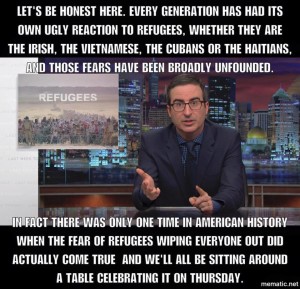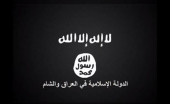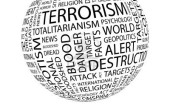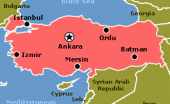Re The UN General Assembly Speaker Schedule is Here! I note that whoever will be speaking for Canada this year…
Wednesday Night #1760
Written by Diana Thebaud Nicholson // November 25, 2015 // Wednesday Nights // Comments Off on Wednesday Night #1760
Honoring our WN tradition of linking to historic events of the year, we hit pay dirt with 1760:
From July 1760, Amherst led an army down the Saint Lawrence River from Fort Oswego, joined with Brigadier Murray [that would be the same Brigadier Murray of Murray Bay, now known as La Malbaie] from Quebec and Brigadier Haviland from Ile-aux-Noix in a three-way pincer,[13] and captured Montreal, ending French rule in North America on 8 September. He infuriated the French commanders by refusing them the “honours of war” (the ceremonial right of a defeated garrison to retain their flags); the Chevalier de Lévis burned the colours rather than surrendering them, to highlight his differences with Vaudreuil for later political advantage back in France. [Things haven’t changed all that much – or have they?] Half the continent changed hands “at the scratch of a pen.” The British settlers were relieved and proclaimed a day of thanksgiving.
How appropriate for the WN immediately preceding American Thanksgiving!
On the Sunday Edition, Michael Enright delivered his weekly – and as is often the case, prescient – essay: The truth about Syrian refugees and how they’ll get here: “It is a daunting task for this country to take in 25,000 Syrian refugees by the end of the year, as promised by the Liberals during the campaign. And it matters little if the deadline is missed by a month or two. The mission is to bring these wretched people out of harm’s way and to a safe, welcoming refuge. It is eminently doable.”
On Tuesday, Minister John McCallum, flanked by 4 ministerial colleagues (including to our mystification, Mélanie Joly) announced that there would be some delay in bringing in all of the planned number of 250,000 refugees. Although headlines are generally somewhat negative (Liberals won’t meet deadline to bring 25,000 Syrian refugees to Canada by year’s end we would agree with the assessment of former BC attorney-general Geoff Plant. Writing in the Globe & Mail, Policy, promises and politics test Canada’s refugee resettlement plan, he concludes: “I do know this: To make bad decisions simply because they were promised is bad government. The first true political test of this new government may be that they have found the fortitude to do the right thing.” We have believed for some time that the target date of December 31 was overly ambitious and while prolonging the wait for any refugees is not a happy thought, the outcome of the revised policy should be much better in the longer run. Meanwhile, we have not heard any clarification regarding the CBC story that the Canada refugee program will exclude single men, other than that gay men will be accepted. We hope this is not true, as it is not only discriminatory, but hands ISIS a perfect recruiting tool.
 Many have criticized and mocked the U.S. Republicans for their mean-spirited attitude towards Syrian refugees, reminding their fellow citizens that they are about to celebrate aforementioned Thanksgiving, an annual reminder that ALL non-indigenous North Americans come from refugee stock. John Oliver has said it best.
Many have criticized and mocked the U.S. Republicans for their mean-spirited attitude towards Syrian refugees, reminding their fellow citizens that they are about to celebrate aforementioned Thanksgiving, an annual reminder that ALL non-indigenous North Americans come from refugee stock. John Oliver has said it best.
And this from The Onion (message duly approved by Kimon Valaskakis & Kyle Matthews) Poll: Majority Of Americans Approve Of Sending Congress To Syria
More seriously, we continue to be astounded and appalled by the pronouncements of GOP front-runners and worse still, the finding that It’s not just Donald Trump: Half of Republicans share his views on immigrants and refugees.
On Monday, Brian Stewart published an optimistic piece There is a plan to end the war in Syria — and it might even work, adding “Something is definitely stirring at the Vienna talks aimed at ending Syria’s vicious civil war and it looks suspiciously like hope — however hard it is to credit any positive news these days.” That, of course, was before Turkey shot down the Russian Su-24 on Tuesday, unleashing a predictably angry reaction from Putin and concerns that NATO faces new Mideast crisis — The downing brings renewed attention to a scenario feared for months by the Pentagon and its partners: a potential conflict arising from overlapping air missions over Syria — with Russia backing the government of Syrian President Bashar al-Assad and a U.S.-led coalition conducting airstrikes against the Islamic State. A number of analysts agree that the Downing of Russian jet hardly a surprise. Meanwhile, the Syrian government backed its key ally Russia, with a military official telling the state SANA news agency that by shooting down the Russian plane, Turkey had committed “a gross violation of Syrian sovereignty”.
A thoughtful piece from the BBC Does the West want democracy in the Middle East? after surveying events throughout the region concludes
“The contradictions are now most pressing in Syria. Western governments are still calling for the downfall of President Assad but hesitate to do much to bring it about for fear of what his departure might bring.
‘What would a post-Assad Syria look like? What would Syrian elections bring? Might Sunni Islamists come to power? How would that suit the West? And Israel?
“That the West has been unable to transform the yearning for democracy, freedom and security in the Middle East into defeats for IS and al-Qaeda is in part a result of the contradiction inherent in arguing for democracy but fearing its results.”
Also recommended, Christopher R. Hill: Syria’s Two Wars, in which the author draws the distinction between Syria’s civil war between Syrian President Bashar al-Assad and rebel groups like the Free Syrian Army, which he suggests can be resolved only through a diplomatic solution – precisely the kind of solution that the peace talks in Vienna, involving a wide range of world powers and regional actors, are aiming to reach, and the second, being waged by the Islamic State, which will require a very different approach.
Wednesday Night’s favorite tag team are featured in the Epoch Times. In Remember Paris and Strike Back, David T. Jones urges overwhelming military force of a broad coalition (“What we do need is rapid action and, in this regard, rapidly deployable light infantry units (U.S. airborne brigades, Marines, French Foreign Legion, British Special Forces, Russian Spetsnaz) are readily available.”) to defeat ISIS. Hon. David Kilgour, Addressing Terrorism, concurs with David Jones on the need for military action, but argues that “Western ground troops for a host of reasons should not be sent to Iraq, but full support should be given by both our governments and others to the most reliable partner of the anti-ISIS coalition: the Kurds and their peshmerga forces.” He also speaks to the plight of the refugees, the crucial issue of successful integration into the broader population and the need to solve the Assad problem.
Mr. Trudeau’s meeting with the premiers appears to have been a successful prelude to the Paris Climate Change Conference (COP21) that opens next week. All premiers agreed on the need for Canada to do more to reduce greenhouse-gas (GHG) emissions and to rehabilitate the country’s international image from laggard to leader.The first ministers endorsed the need for their governments to fashion a national climate strategy that will build on provincial plans and agreements. But decisions were put off about what the national target will be, how each province will contribute to that goal, and how forthcoming federal funding will be divvied up among the provinces. Saskatchewan Premier Brad Wall sounded a cautionary note, saying the need to make progress on climate must be balanced with concern for the hard-pressed energy sector, where tens of thousands of workers have lost their jobs – a reasonable concern. Certainly, the tone of the meeting was helped by the announcement on Sunday by the Alberta government which unveiled a series of measures – including an eventual cap on oil-sands emissions. The plan was supported by senior executives from four leading Calgary-based oil companies – as well as former U.S. vice-president and well-known climate campaigner Al Gore, who characterized it as a “powerful signal,” albeit a first step.
What Canada’s New Foreign Policy Means for the U.S.– an interesting view from Bloomberg.
The Charbonneau Commission report has finally been released – all 1,700+ pages. CBC offers A deeper look at nine of the key recommendations and why they matter in the context of combating corruption and collusion. Now it remains to be seen how quickly the recommendations are acted on.
And so to good news and events for your calendar.
Edmonton student first-ever First Nations Rhodes scholar from Canada
It is no secret that one of Diana’s favorite projects is Teach for Canada, co-founded by Sauvé Fellow Kyle Hill and Adam Goldenberg. We are, therefore happy to spread the word that Teach For Canada is hiring. looking for two dynamic changemakers to join the growing team:
Director of Development and Teacher Recruitment and Selection Manager. Do pass the word to enthusiastic young friends.
Linda Leith (Linda Leith Publishing LLP) reminds us of this weekend’s events at the Atwater Library Celebrating English-Quebec Writing and Publishing
with 50 writers, including book fair host Terry Mosher and ten other LLP stars.
Friday November 27, 2015 from 5:00 to 8:00 pm
Celebrate the Launch of the Fair in our auditorium – Raise a glass, meet some authors and buy some books! The publishers and authors gather to sign and sell books. Join us for wine, cheese and vegan snacks.
Saturday, November 28, 2015 from 10:00 am to 4:00 pm
More than 25 participating publishers – more than 50 local authors. Fiction, non-fiction, poetry, books for kids, award-winners, bestsellers and more. And door prizes!
Give the gift of a book from here.
See Ian McGillis’s Montreal Gazette story with names and details.



